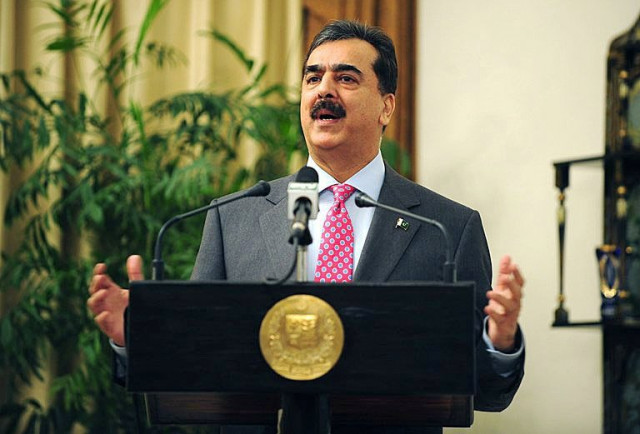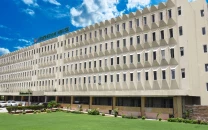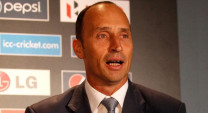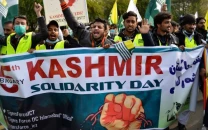Not a clash of institutions, insists Gilani
PM says there is no confrontation with the judiciary, but every institution has to remain in its domain.

Prime Minister Yousaf Raza Gilani has termed the on-going tussle with the judiciary a “clash of powers, not of institutions.” Talking to journalists in Karachi at the Governor House on Friday, Gilani said there was, as such, no confrontation with the judiciary, but added that, in a trichotomous system of power, every institution has to remain in its domain.
“When they cross the line, there will be a clash,” he commented, but added that the judges were also his friends. “The judiciary has fought for its rights. We are also fighting for our rights,” he said.
Giving the background to the current stand-off over the appointment of National Accountability Bureau (NAB) chairman Justice (retd) Deedar Husain Shah, the prime minister (PM) said that it was the president who appoints a nominee to this position after consultation with the prime minister and the leader of the opposition. “The operative word here is consultation not approval,” Gilani said. Prior to Justice Deedar Shah, the president had nominated Justice (retd) Junejo to the position. “But this was shot down by the leader of the opposition on the grounds that Justice Junejo as chief election commissioner had rejected the nomination papers of former president Rafiq Tarrar,” recalled the PM.
After this, he said, the president has nominated Justice Deedar Husain Shah “because the justice was acceptable to Mian Nawaz Sharif. In fact, when Justice Deedar Husain Shah was elevated from the Sindh High Court to the Supreme Court, Mian Nawaz Sharif had complained about the removal of an honest and fair judge and alleged that it was done at the behest of the agencies.” However, Gilani said this candidature was also rejected by the leader of the opposition “for reasons best known to him.”
The PM said that he recalled the words of the president who had said that all candidates he would propose would be rejected by the opposition leader. However, “since he was supposed to consult and not seek approval, the president went ahead with appointing Justice Deedar Husain Shah as NAB chairman.” Now, he said, the two issues that are being raised are that the opposition leader was not consulted “but this is not true as we have his reply in writing”, and that the appointment was made without the advice of the PM, “which is also not true and I will give my written advice when required.”
Gilani said that the government was avoiding confrontation so it could stabilise the system. On the issue of the removal of the Director-General of the Federal Intelligence Agency, the Prime Minister said that it was a larger issue and not one that pertained to individual cases.
Earlier on, the prime minister briefed the journalists on the challenges his government is facing. He said that the challenges included global recession, state of the economy, tackling the after-effects of floods in the country and the war on terrorism.
‘Protest a provincial subject’
When the PM’s attention was drawn to the violence seen overnight in Karachi, Gilani said that it was a provincial subject.
One journalist also pointed out that the frequent outbursts by the Sindh home minister adversely affected the law and order situation in the city, the PM replied that President Zardari “has had a discussion with him.” On this, the journalist pointed out that this gave the impression that the home minister was running the province. In reply, the prime minister turned to Chief Minister Qaim Ali Shah and said “Shah Sahab Himmat Karen.”
One editor commented that he had rarely seen a ruling party calling for a strike while in power. In reply, Gilani said that “these are the fruits of provincial autonomy. I cannot stop them now.”
Gilani said that the war on terror and extremism was a twin threat facing Pakistan. He was asked to explain why the government was not taking action against growing belligerence in religious circles and the practice of issuing public fatwas in religious gatherings and writing of threatening letters, Gilani said that the country “did not face any extremism from within.”
The threat is from al Qaeda and foreign forces, he explained.
Published in The Express Tribune, March 12th, 2011.



















COMMENTS
Comments are moderated and generally will be posted if they are on-topic and not abusive.
For more information, please see our Comments FAQ